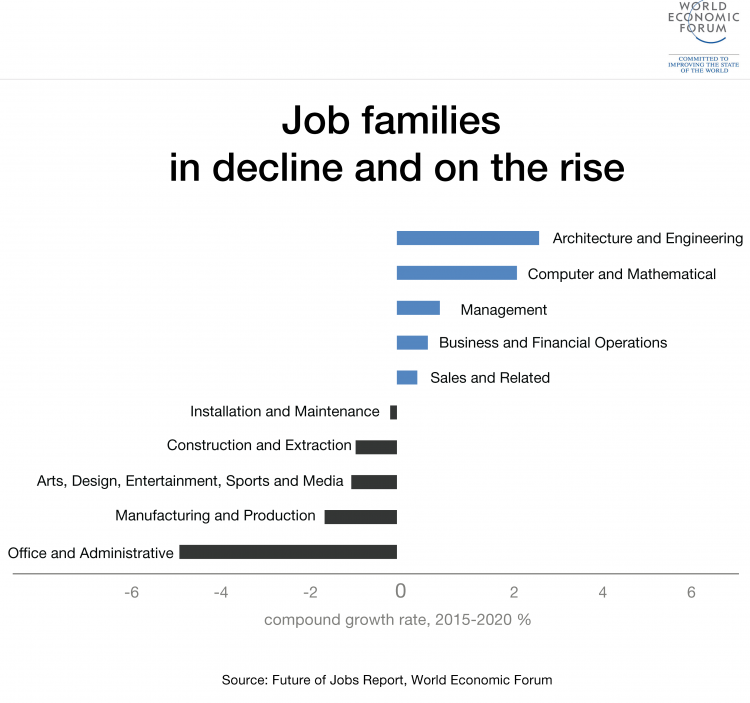
06 Jul Rebranding maths in schools
As student I never felt I was particularly excellent at maths; all memories I have are about trying hard at home without really knowing what I was expected to do. Later as a Head Teacher I have come in contact with departments and areas where maths is very necessary but more important than that I met parents and talked to many students who are concern but willing to get better at maths. Why is that?
What can we do as a School to change students perceptions about Maths? It is time to reflect that despite huge advances in technology in the classroom why more students are struggling more than ever with mathematics? How can the Maths Department and School work together to improve the level of a core subject that develops essential skills such as: critical & analytical thinking, problem solving, interpretation of data and creativity, skills which are essential in many different jobs.
According to the World Economic Forum Maths is one of the most in demand subjects by employers, what can only prove once again that we must do something about it in order to change students perception, meet their needs and raise their confidence, the same that they could have about Arts, Literature and many humanistic subjects.

I talked with my colleague Mike Taylor who is Maths Teacher who has worked in a number of international schools, to give us his view about what the main issue is and how we can solve it in schools. He started by saying that it is socially accepted “not being good at maths” and people identify (often with great pride and humour) that it is absolutely fine to make such a statement without realising they are propagating a damaging statement which is disenfranchising thousands of students from achieving their true potential in mathematics.
He has taught many students from different countries who arrive in high school/secondary school with a false perception that they are weak at maths. “Yet I don’t hear many adults admitting that they can’t write very well or express themselves in a letter, verbally or in an essay. No for some reason it is ok to declare weakness at mathematics but not weakness at communication and language as perhaps that might suggest that the person is less than average intelligence”.
Mathematics seems to have a general perception that it is difficult, complex and uses a language which alienates students and adults alike. Students are quick to give up and admit defeat at the first sign of a maths problem and don’t seem to have the persistence and concentration to see a multi step problem through to its conclusion- Why is this?
Basically because many students are not equipped at the right stages in their education with adequate levels of what he calls as “critical areas”:
- Basic arithmetic.
- Comprehension and vocabulary in order to model a problem
- Fluency to identify what mathematical knowledge is needed to solve the problem
- Knowledge of key maths concepts such as formulas and theorems
- Self evaluation and accuracy skills.
Why do Singapore and China have so much success teaching maths and yet when other countries such as the UK have tried to mirror the model used by these countries there has been very limited success and has attracted huge amounts of criticism.
Having taught in the UK, Europe and the Middle East Mr.Taylor believes the success in Singapore and China and also Finland (ranked as the best education system in the world) is because of matching a teaching style to the culture of the students.
“I remember some teachers from Shanghai who came to my school in south London on an exchange program to exchange teaching best practises. They had very little success or engagement from our students (irrelevant of the student ability) and to me it was obvious. You cannot expect the values and culture of native students to embrace a teaching style which does not relate to them as individuals”.
Good Mathematics is not about HOW MANY ANSWERS you know… it is about HOW YOU BEHAVE when you don’t know

So the challenge to us as maths teachers and as Schools is to provide and balance the delivery of learning in the five areas listed above but in order to get our students to be able to retain and then use and apply these skills we have to get onto our students radars by the use of inclusive and relatable language:
- inclusive in the sense that when a teacher asks a question they don’t exclude the majority of the class because they can’t comprehend the question.
- relatable in the sense that concepts have to be demonstrated, investigated and concluded using terms and explanations that students can see, touch and understand and use.
Maths needs to be felt and experienced by our students if we expect them to engage, experiment and to solve problems independently. Maths classes need to be cemented in the classroom but explored in every area of the school and within every subject from physical education right the way through to Art as all of the curriculum has maths flowing through it just the same as all the curriculum has language as a core component. Maths is simply another language the same as Literature and Arts, that needs to be learned and used correctly and its connections with other subjects is unavoidable as our ancient Philosophers already pointed out or later on as Leonardo Da Vinci expresses through his paintings, most of them a pure representation of maths understanding.
"the mathematical sciences particularly EXHIBIT ORDER, SYMMETRY and LIMITATION; and these are the greatest FORMS OF THE BEAUTIFUL" Aristotle
In our next post we will examine an actionable plan to implement regardless the curriculum in place in any school. Coming soon …





